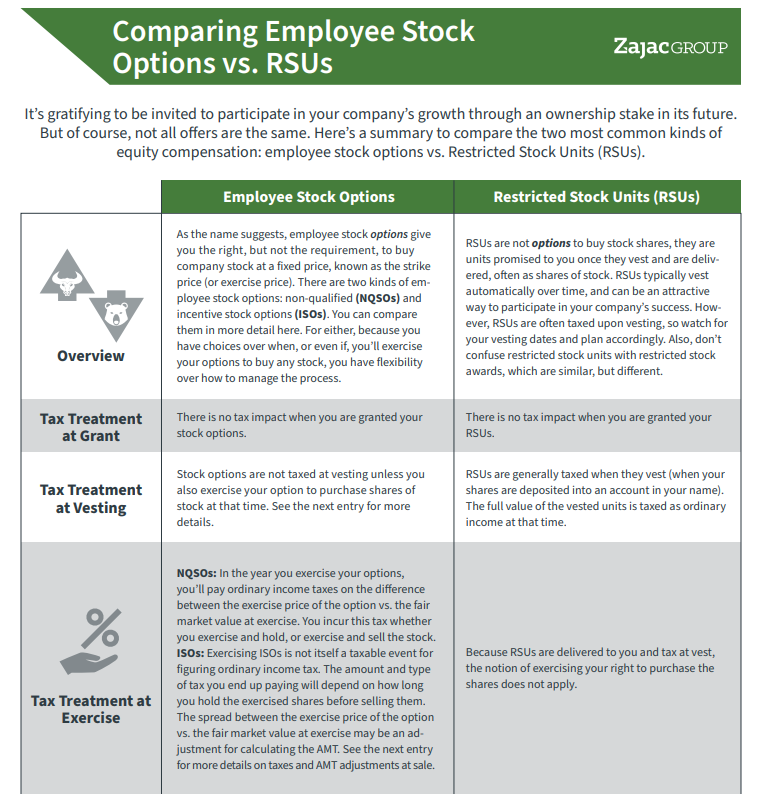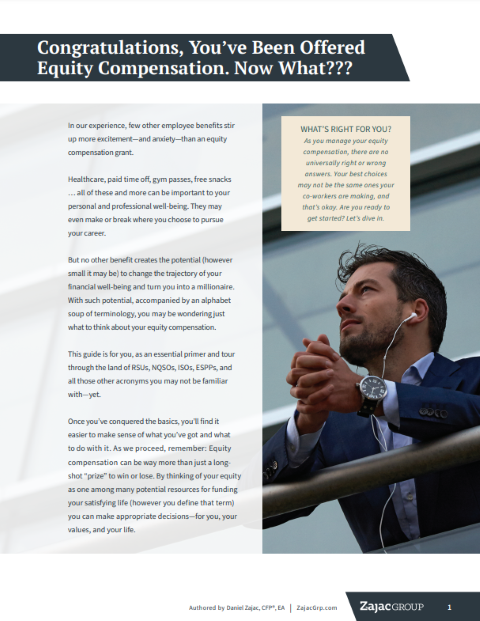Restricted stock units, or RSUs, are often used as part of a compensation package for a key employee. Employers may offer restricted stock units in place of providing cash directly through a pay bump or raise.
If you have restricted stock units, you have a right to receive shares of stock (or the cash equivalent for those shares) after you’ve satisfied specific conditions detailed by your employer. Those conditions are usually tied to continued employment with the company for a stated period.
Another way of saying this is that restricted stock units come with a vesting schedule. If you leave the company before your restricted stock units vest, then you give up your rights to them. This is commonly known as having a substantial risk of forfeiture.
Again, you don’t own any shares when you have restricted stock units — just the promise to have shares at some stated point in the future. Once you meet the stated conditions and your restricted stock units vest, then you can own the shares outright.
A Look at Restricted Stock Units – And How They May Be Used
Restricted stock units provide potential advantages to both the employer offering them and the employee who could receive them.
From the employer’s standpoint, restricted stock units may apply the “golden handcuffs” to an employee. Because restricted stock units are nothing more than a future promise, the idea is that you might stay with the company (when you otherwise could have left) to access the offered shares of potentially valuable stock.
COMPARISON GUIDE
Not All Stock Offers are the Same! Here's a helpful comparison between two of the most common employee stock options.
For example, say your employer gives you 1,000 restricted stock units of company stock. Assume the stock is worth $50 per share, and those RSUs vests in 3 years. To receive the benefit of owning those shares currently valued at $50,000, you have to continue to work with the company for at least three years until your RSUs vest.
Leave early, and you forfeit $50,000 of current value. This is where a promise of receiving equity worth $50,000 in the future may keep you working hard in the present.
Your employer gets a big benefit there (while you could get the benefit in the future). But another, shared benefit that you could both enjoy is the opportunity for price appreciation.
The value of the units will fluctuate between the time your company offers your RSUs and the time they vest. Should the price of the stock increase, the total value of your restricted stock units goes up, too.
If the company’s shares started at $50 per share, but rise to $75 per share over your 3-year vesting period, then the total value of your RSUs would move from $50,000 to $75,000.
Of course, this works the other way around too. If the price goes down, your RSUs drop in value — a risk you take by hanging on and remaining with your employer during the vesting period.
Naturally, you and your employer hope the share prices rise over time. This is another reason employers offer restricted stock units to incentivize employees. The thinking goes that you and your coworkers are highly motivated to do everything you can to increase share value since you’re directly rewarded when that value goes up.
What Should You Think About Once Your Restricted Stock Units Vest?
After satisfying the stated conditions detailed by your employer, the restricted stock will “vest.” Upon vesting, there are two items that should be considered: ownership and income tax.
Upon vesting, you will often receive actual shares of stock that you own outright. This means that you have full ownership privileges that come with being a stock owner. You can retain the shares, sell the shares and convert to cash, and receive dividends.
When the restricted stock units vest, the value is taxed as ordinary income subject to payroll taxes. You are taxed because there is no longer a substantial risk of forfeiture, and you’re responsible for paying income tax on the value received.
Correctly, the taxable value is calculated as:
Number of Restricted Stock Units x Share Price at Vesting = Taxable Income
Depending on the number of units, the share price, and your tax rate, the tax liability of vested restricted stock may be significant.
Continuing our example above, let’s assume the share price is $75, and the person’s tax rate is 33%. We can use this information to estimate the taxes due.
Step 1 – Calculate Taxable Income
1,000 shares x $75/share = $75,000
Step 2 – Calculate Projected Tax Liability
Taxable Income x Tax Rate
$75,000 x 33% = $24,750
In this example, the income tax due is $24,750.
Many companies will withhold income tax for you when the restricted stock units vest. This is commonly done with a cashless exercise (aka a share withholding at vesting). However, the amount they withhold may or may not be enough to cover your total tax liability.
How you pay for any remaining tax liability is up to you. Option one is to write a check for this tax due (if you have the cash lying around). Another option could be to immediately sell some of your newly vested shares on the open market to cover the cost of additional tax due.
You Own Company Stock: Now What?
After a restricted stock units vest, it’s important to consider how owning company stock fits into your overall financial plan. You need to ask yourself if it makes sense to own a large position of company stock — or does it make sense to sell and diversify?*
Additionally, you should ask yourself what you would do if your company paid you in cash instead of paying you in stock.
Remember, just because you received the restricted stock units as shares of stock doesn’t mean you need to keep the shares. In our restricted stock scenario above, you earned $75,000 when the shares vested (compensation for your time), which was paid to you in company stock.
But what if that $75,000 were paid to you in cash instead? If it were, would you immediately use $75,000 to buy company stock?
I guess that for many, that answer is no. And if the answer to this question is no, does it make sense to retain the stock just because it was paid that way? Probably not.
If you feel this way, it may make sense to incorporate this feeling into a liquidation strategy for your restricted stock units. You may also want to consider other factors, too, because to be fair, the complexities, rules, and opportunities of RSUs go beyond the scope of this article.
Not only that, but it’s important to understand what you have in restricted stock units and what you have elsewhere. Furthermore, plan specifics are different for various companies. Before pulling any triggers or making any decisions, it’s essential to evaluate how your plan rules work and what your intentions are.










Thanks for the descriptive article. The post is very informative and I was not at knowing about the Restricted Stock, now I got to know. And you have explained it very well. Looking forward to more article.